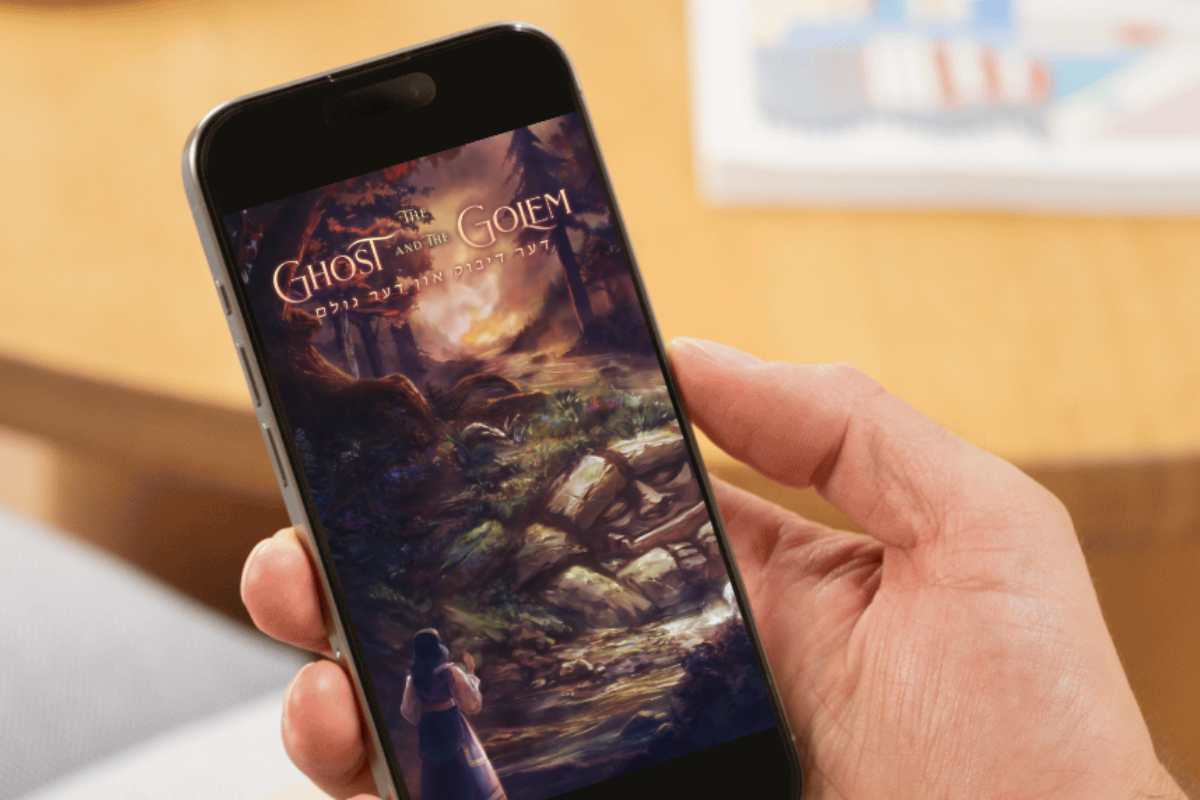Being a Jewish fantasy fan is tiring. Generic European-inspired settings feature churches but not synagogues, Christmas but not Passover, spirits but not shedim. It’s hard to feel welcomed by a genre where the characters you have the most in common with are greedy dwarven traders or baby-stealing witches whose continued existence, despite the protests of Jewish fans, sends the message: “The world doesn’t care about your experiences.” Last August I found a game that took my hand and said, “Well they should!”
The Ghost and the Golem is a work of interactive fiction by the Hugo and Nebula Award finalist Benjamin Rosenbaum. I was familiar with his previous work from the tabletop roleplaying scene, and was stoked to see him venturing into another format I love. Interactive fiction is the digital successor to choose-your-own-adventure books where instead of having to flip to a certain page, a mere click will show you a choice’s outcome.
Throughout my years of playing interactive fiction, I would always project Judaism onto my protagonists. The Ghost and the Golem is the first piece I’ve found where my character’s relationship with Judaism can be made explicit and impact the story. After all, if the title wasn’t enough to communicate this, The Ghost and the Golem is a work rooted in Jewishness.
The setting is a late 19th-century shtetl in the Russian Empire where tensions between local ethnic groups are rapidly rising. You (as your character) juggle both the mundane and the mystical, squabbling with your siblings one moment and then resisting a sheyd’s temptations the next. The main plot surrounds your attempts to prevent/prepare for the eruption of a pogrom, but there are a multitude of more lighthearted sidequests for you to undertake, such as dealing with your mother’s matchmaking or singing drinking songs with your neighbors.
This broad cast of characters (which includes all sorts of people from polyamorous anarchists to scandalized rebbetzins) are distinct and each come with their own mystery to solve. In case they ever get confusing, there’s a cast compendium just a click away, along with a glossary of potentially unfamiliar terms. I cackled when one of the first decisions I was asked to make was to specify how many Yiddishisms and explanations of Jewish concepts I wanted the narration to include.
Speaking of the narration, it is absolutely hilarious, constantly chiding you for your decisions and calling you “bubbeleh” with exasperated affection. The writing as a whole is full of wit, bubbling with life and dancing the reader along at a pace that feels spritely but not rushed. The prose was suitably reminiscent of a Sholem Aleichem fable and those familiar with Yiddish literature will pick up on subtle references to his and other writers’ works sprinkled throughout the story.
Your character is customizable and the game gives you the options to make them intersex, trans, queer, asexual and/or polyamorous. Many would try to deny that these identities ever existed within shtetls, but The Ghost and the Golem pays conscious homage to historical instances of how Ashkenazi culture has represented them and includes a bibliography for any skeptics. The potential love triangle between a male protagonist, his friend from yeshiva and the girl he’s been matched with felt straight out of “Yentl the Yeshiva Boy”; midrashim surrounding the label of tumtum (agender) can come up multiple times in a single playthrough; and Shira the passionate, crossdressing klezmer felt like a role made for Molly Picon!
When creating your character, you are expected to give them a nickname. If you try to refuse, the narrator will chide: “Honestly, bubbeleh, I sympathize… but you really can’t stop people in the shtetl from calling you by a nickname. They’ll use it affectionately, they’ll use it derisively, they’ll use it absent-mindedly… but they’re going to use it.” Having heard my own Hebrew name, Rakhel, twisted into every diminutive one can imagine (from the classic Rakhele to Raschka to even Rakheroonie) this detail made me feel at home. It embraced an understanding of community and the world that is integral to my life, the absence of which in most other media feels like a gaping void.
When I interact with The Ghost and the Golem, I’m not just roleplaying, I’m reliving. The comments its Christian villagers mutter are ones that have been said to my face, the garrison’s willful ignorance of local antisemitism is the sort I encounter on my campus every day, but the Yiddishisms of the narration are a friendlier kind of familiar, along with the plot’s creatures, concepts and community. This game fulfilled fantasies of mine that I suspect many other Ashkenazim share: saving relatives from pogroms, preserving one’s community, gaining mystical powers and running away to join a klezmer polycule.
Oh. That last one’s just me? Okay then. I can only encourage you to play the piece yourself to see which of your fantasies it fulfills.



